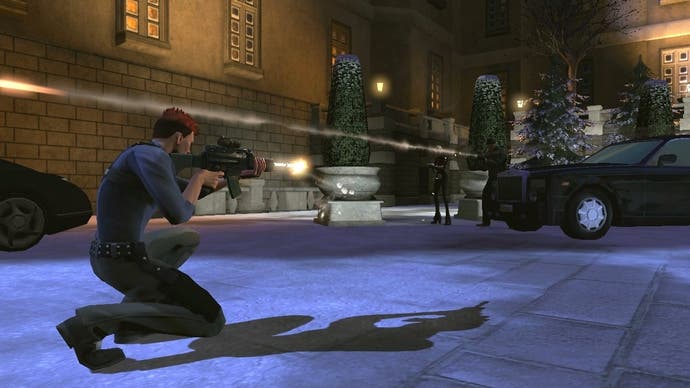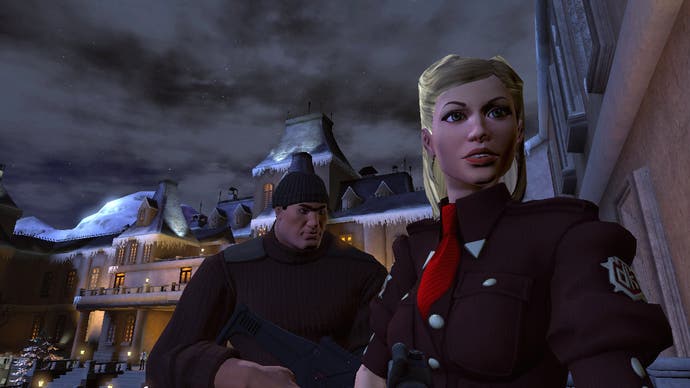The Agency
Spies like us.
The upgradeable camera is one of The Agency's most valuable tools, the developers having paid keen attention to the use of photography in games like Dead Rising, Beyond Good & Evil and Pokemon Snap (which Milton thinks is "one of the most brilliant shooters ever made"). Its main use is in gathering static intel, but you might also have to tail NPCs at certain points.
Having negotiated the stealth section, the agents meet their contact, and after a brief cut-scene their cover is blown and they're plunged into combat. This is third- or first-person shooting modified with RPG skills, assigned to three banks of five. On a pad, quick skills are mapped to L2 and R2, while a combination of triangle and stick-flicks selects the rest. The two notable skills we see are a stamina (i.e. The Agency's skill resource, or "mana") and armour buff, and the rather more colourful "Martini bomb", a cocktail-shaker grenade that freezes enemy weapons.
The latter's an example of a gadget-based skill that can be built, found or bought - not all abilities in The Agency will come from ranking up. You might get skills from "unlocking the blueprint so you can always make the Martini bomb, or finding the bartender who has the field assignment where you can pick them up from him," says Milton. "But you'll also have inherent skills and abilities, passive skills, and active buffs, things like, 'I've increased my reload rate for all pistols now, or I've increased all my stealth abilities and have the ability to do an acrobatic dodge [to mitigate damage]."
In fact, you can forget about standard MMORPG progression altogether. In The Agency, you 'll be unlocking things and advancing your character on several fronts, most notably within your faction, within your role, and within weapon classes. "The philosophy behind it is that we didn't want to have one monolithic level ding, we wanted to kind of spread that around," explains Milton.

"So first off, you have your rank within your agency. The higher your rank, the more operatives you can have, the higher rank they can be, the more stuff you can use, the more places you can go. And you increase your rank by completing career missions. Then you have your role, the thing you use to complete those career missions and explore the world - your combat, stealth and support, switching freely between them. As you complete either career or side missions, you're getting XP for your roles, unlocking new titles which unlock new skills and outfits and attachments and accessories.
"Killing guys and using items in the field gives use-based experience for our weapons families. You're unlocking new slots for attachments, new skills that are specifically for the weapons over time. All those things ding at different rates. And last but not least, your operatives will advance over time as they perform assignments for you. All of that is part and parcel with some other things we have like influence and reputation, and those are managed and raised in order to unlock access to career and side missions and operatives..."
It sounds like a lot to keep track of in a game that's intended to be played in shorter sessions than most MMOs. "But that's what's so great about it, because it's really simple concepts, right?" says Milton. "'Well you know, I'm a few days away from promotion with the agency, but I'm only a few hours away from this title. But tell you what, if I can unlock this skill on my weapon in 15 minutes, I'm going to be awesome!' What we want is a whole bunch of carrots, from the short term to the long term, and players don't have to worry about much when they start."

Operatives could well be The Agency's most compelling time-sink, with alignment properties (faction, star sign, blood type, morale) that will govern how well they work with each other, and a huge range of ways to unlock them - missions, trading, operative assignments, combos of operatives that unlock others, intel gathering, PVP rewards. "We are splitting up the operatives pool," says Milton. "The ones you can always get, the ones that are luck of the draw, the ones that are rares that you have to get through headhunter assignments or other special actions, and the ones that are big bone-daddy rewards for being so damn tenacious."
Operatives divide into field ops, administrative ops, research ops and manufacturing ops "which creates the lovely acronym FARM", says Milton. You can only pick certain of these to be active at any one time, and initially only one field op who will help out in missions, although this will scale up later. But you also have a roster of operatives you've recruited to pick from, and a temporary recruiting area where operatives will appear as you earn them, and you can choose whether to dismiss or recruit them to your roster.
In other words, operatives are loot, and hopelessly irresistible loot at at that. Pursuing and sorting an ideal roster will be akin to assembling a perfect gear set in an RPG - if your gear argued with itself, made more gear for you while you were offline, and you could equip 100 pieces at once at max level. Any gamer with obsessive-compulsive tendencies (and let's face it, that's most of us, especially in MMOs) will be going weak at the knees right now.

